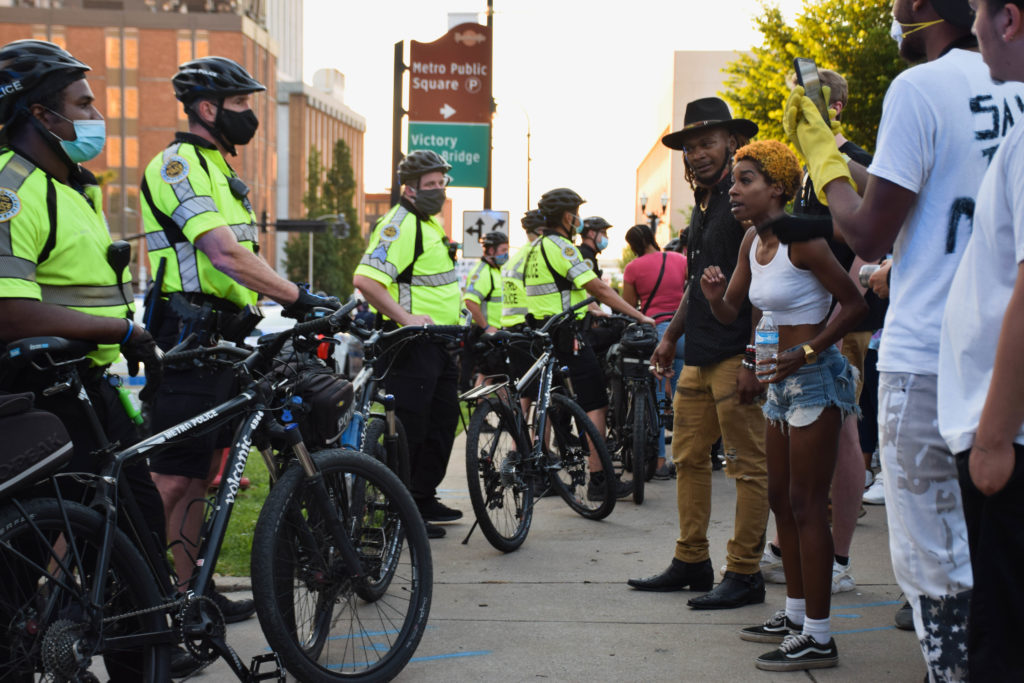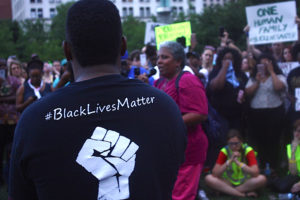
Scrutiny has again descended on policing tactics, with intense protests and reform efforts playing out across the country and in Middle Tennessee.
In Nashville, the city is making some movement. Officials announced Monday that they had found a way to continue rolling out body-worn cameras for officers, after years of delays. And in response to a record-setting Metro Council meeting, some leaders are considering a city budget that would keep police department funding level, instead of increasing it by 1%.
But the tension is hardly new.
Here is a small set of stories about policing over the past few years, to provide history and context to the current discussion:
1. Nashville Police Launch Department-Wide Training To Recognize ‘Implicit Bias’
Police announce in August 2016 they’ll take a few months to put all 1,300 officers and new recruits through a six-hour course on bias. The course adds to a bias screening process for recruits.
2. Nashville Police Academy Will Stop Using Racially Charged Textbook
In early 2017, reporting by WPLN News questions the use of the “Tactical Edge” textbook at the city police academy. Then-Mayor Megan Barry soon questions Police Chief Steve Anderson in a public budget meeting, and the department vows to remove the book from its curriculum.
3. The People And The Police
A pair of incidents are caught on video in a public housing complex. One goes viral showing an assault on a Nashville officer; the other documents a fatal shooting after a traffic stop. Together, they show the fractured relationship between the community and the police.
 4. A trio of stories on traffic stops
4. A trio of stories on traffic stops
As of summer 2016, a central demand from Black Lives Matter Nashville is to discontinue a policing effort known as Operation Safer Streets, which sends additional officers into areas with high crime stats.
That fall, researchers use police data to document a racial disparity in Nashville traffic stops and vehicle searches, prompting a call for change.
Two years later, a national research group confirms similar findings.
5. Shootings By Police Ramp Up Workload For TBI
Law enforcement agencies across Tennessee have steadily inked agreements with the Tennessee Bureau of Investigation to provide independent reviews when police use force. In a three-year period such investigations doubled, to 81 in 2017. TBI has since made a rolling list of investigations public. There were 45 police shooting investigations in 2019.
6. More Nashville Police Trying Community Engagement, But Seeing Results May Take Time
In some areas, Nashville police officers have begun to intentionally get out of their patrol cars to talk with residents one-on-one. The mission, they say, is engagement rather than enforcement.
7. Friction Grows Between Nashville Community Oversight Board And Police
After voters support an independent review board to look into police misconduct allegations, the newly created Metro Community Oversight Board begins its work in 2019 amid considerable tension. A disagreement goes public between the police chief and the board’s director, who resigns the following month.
8. Three Years, Three Mayors And Still No Body Cameras
By November 2019, it has been three years of pledges to purchase and equip Nashville officers with body cameras. This story includes an interactive timeline of the local pursuit of body cameras, and details the rising cost estimates for the system.
9. Nashville Officer Facing Murder Didn’t Pull Gun During Earlier Foot Chase. He Was Criticized.
As Nashville awaits an unprecedented first-degree murder trial against Officer Andrew Delke, WPLN News examines records of his prior tense encounters in policing. They show the challenges that officers face, including mixed messages from training, supervisors and the public. This story is the first installment of the WPLN Investigates: Deadly Force podcast.

